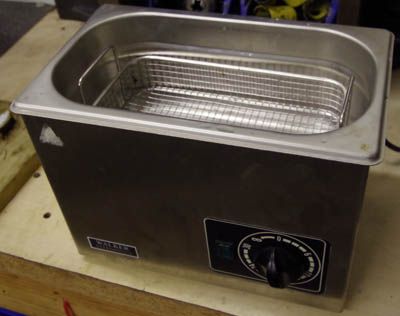A few comments on recent posts:
"Russell, is your cheap Aldi unit as noiticeably active as this – I'm wondering if yours is a bit of a dud, or if I could achieve even better results with a proper unit."
I think my Aldi unit may have deteriorated with age. It is supposed to produce 50 W of ultrasonic power yet I have measured it's power input and it only consumes 40 W so I doubt if it would be producing mre than 20 W. Small items put in it do jiggle about a bit.
"A lot of people have un-realistic expectations of what these machines actually do, they seem to expect a grubby old casting to come out nice and shiny. This is not going to happen."
It depends very much on what cleaning fluid you use. The castings shown in Neil's article were cleaned using Allendale's Oxidation and Rust Removal solution. That is a 10 to 20% solution of citric acid so 1 or 2% after dilution – a rather expensive way to buy citric acid but effective.
"if you are cleaning brass parts you can get good results using one of the ammonia based clock cleaning solutions, this will brighten the brass as well as removing dirt"
Agreed, I have used Horoclean in the past, a mixture of ammonia solution with various organic solvents. For some reason it can't be exported.
"Optics can also be cleaned but again a short immersion time."
I would be a bit concerned about coated lenses having seen paint removed from metals. Have you tried it Clive?
"Some precious stones have been know to be damaged by ultrasonics so I am led to believe."
Yes, don't put pearls or opals in the bath. Any stones with cracks are liable to be damaged, especially emeralds. There should be no problem with other gemstones.
As an aside, I have found that washing up liquid isn't very good as it foams too much. Many American sites recommend using Simple Green whatever that is but I have a 5 litre container of detergent sold by Lidl for use with pressure washers and that works very well – add a dash of ammonia for use with brass.
Russell.
 Russell Eberhardt.
Russell Eberhardt.






